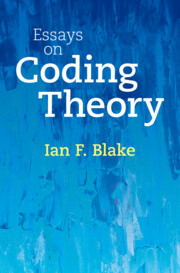Refine search
Actions for selected content:
6934 results in Communications and signal processing
15 - Postquantum Cryptography
-
- Book:
- Essays on Coding Theory
- Published online:
- 08 March 2024
- Print publication:
- 14 March 2024, pp 380-403
-
- Chapter
- Export citation
13 - List Decoding
-
- Book:
- Essays on Coding Theory
- Published online:
- 08 March 2024
- Print publication:
- 14 March 2024, pp 327-360
-
- Chapter
- Export citation
6 - Coding for Distributed Storage
-
- Book:
- Essays on Coding Theory
- Published online:
- 08 March 2024
- Print publication:
- 14 March 2024, pp 157-181
-
- Chapter
- Export citation
Appendix A - Finite Geometries, Linearized Polynomials and Gaussian Coefficients
-
- Book:
- Essays on Coding Theory
- Published online:
- 08 March 2024
- Print publication:
- 14 March 2024, pp 443-449
-
- Chapter
- Export citation
10 - Batch Codes
-
- Book:
- Essays on Coding Theory
- Published online:
- 08 March 2024
- Print publication:
- 14 March 2024, pp 255-274
-
- Chapter
- Export citation
Dedication
-
- Book:
- Essays on Coding Theory
- Published online:
- 08 March 2024
- Print publication:
- 14 March 2024, pp v-vi
-
- Chapter
- Export citation
16 - Quantum Error-Correcting Codes
-
- Book:
- Essays on Coding Theory
- Published online:
- 08 March 2024
- Print publication:
- 14 March 2024, pp 404-423
-
- Chapter
- Export citation
9 - Private Information Retrieval
-
- Book:
- Essays on Coding Theory
- Published online:
- 08 March 2024
- Print publication:
- 14 March 2024, pp 230-254
-
- Chapter
- Export citation
1 - Introduction
-
- Book:
- Essays on Coding Theory
- Published online:
- 08 March 2024
- Print publication:
- 14 March 2024, pp 1-25
-
- Chapter
- Export citation
Appendix B - Hasse Derivatives and Zeros of Multivariate Polynomials
-
- Book:
- Essays on Coding Theory
- Published online:
- 08 March 2024
- Print publication:
- 14 March 2024, pp 450-453
-
- Chapter
- Export citation
Index
-
- Book:
- Essays on Coding Theory
- Published online:
- 08 March 2024
- Print publication:
- 14 March 2024, pp 454-458
-
- Chapter
- Export citation

Essays on Coding Theory
-
- Published online:
- 08 March 2024
- Print publication:
- 14 March 2024
Chapter 5 - Mobile Radio Propagation: Small-Scale Fading and Multipath
-
- Book:
- Wireless Communications
- Published online:
- 22 March 2024
- Print publication:
- 08 February 2024, pp 177-254
-
- Chapter
- Export citation
Appendices
-
- Book:
- Wireless Communications
- Published online:
- 22 March 2024
- Print publication:
- 08 February 2024, pp 601-692
-
- Chapter
- Export citation
Chapter 8 - Speech Coding
-
- Book:
- Wireless Communications
- Published online:
- 22 March 2024
- Print publication:
- 08 February 2024, pp 415-446
-
- Chapter
- Export citation
Appendix F - 𝑄, erf & erfc Functions
-
- Book:
- Wireless Communications
- Published online:
- 22 March 2024
- Print publication:
- 08 February 2024, pp 645-650
-
- Chapter
- Export citation
Appendix I - References
-
- Book:
- Wireless Communications
- Published online:
- 22 March 2024
- Print publication:
- 08 February 2024, pp 675-692
-
- Chapter
- Export citation
Appendix E - Gaussian Approximations for Spread Spectrum CDMA
-
- Book:
- Wireless Communications
- Published online:
- 22 March 2024
- Print publication:
- 08 February 2024, pp 621-644
-
- Chapter
- Export citation
Chapter 11 - Wireless Systems and Standards
-
- Book:
- Wireless Communications
- Published online:
- 22 March 2024
- Print publication:
- 08 February 2024, pp 533-600
-
- Chapter
- Export citation
Appendix D - Approximate Spatial Autocovariance Function for Shape Factor Theory
-
- Book:
- Wireless Communications
- Published online:
- 22 March 2024
- Print publication:
- 08 February 2024, pp 619-620
-
- Chapter
- Export citation
